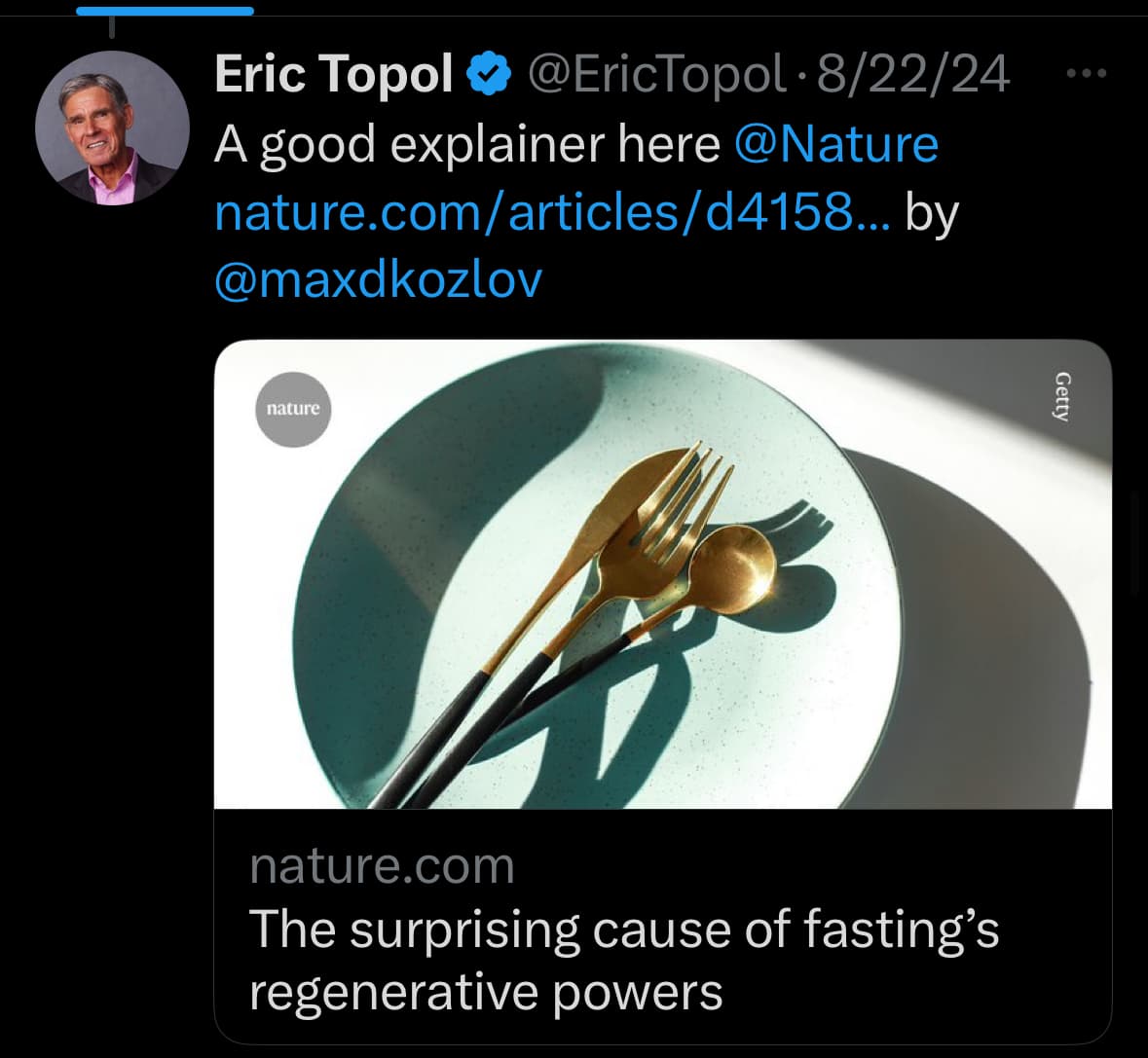My first meal is around 12:30 to 3 PM. Normally it will consist of a whey-based protein drink, egg omelet, or occasionally, oatmeal with walnuts and blueberries. I eat dinner at 5 PM.
Because I always eat dinner with someone else it could be anything from spaghetti to steak.
I don’t claim my diet or eating window is optimal, it is just what I do.
Interesting, is this mostly a conjecture or have you also seen any studies supporting this concept?
Pure conjecture.
No idea if it makes any difference.
Just something I do as activated charcoal capsules are very cheap.
I have toyed with the idea of activated charcoal following meals taken with acarbose, for obvious reasons ;p
Got it, thanks for color.
This experiment and theoretical biology points in the direction that, when fasting, it is not only the restriction of total calories that is important for longevity. But also the experience of feeling hungry. Feeling hungry is in itself a biological signal that change our biology in a healthful direction, towards longevity. This is not directly translatable to humans, but it brings forward a new topic the do research on.“The hunger signal”.
“While it has been long understood that limiting the amount of food eaten can promote healthy aging in a wide range of animals, including humans, a new study has revealed that the feeling of hunger itself may be enough to slow aging.”
The feeling of hunger itself may slow aging in flies – ScienceDaily
I’m actually so hungry lately it’s annoying, ~2h after finishing a meal I feel hungry again
Is it the rapamycin? Or the acarbose? Both?
Hmm… I take both. My appetite has decreased so I am eating less. Opposite reactions?
I start about 3:00-3:45pm and end at 16:30 OMAD every single day. I never feel hungry at all, don’t have naps and have good amounts of energy all daylong! My sleep score is good and feel nice and easy all time! My blood bio markers are ok, never have teeth issues. So for me N=1, it fits correctly!
Might also explain the benefit of red light therapy.
To look at hunger apart from dietary composition, they used a unique technique, activating neurons associated with the hunger drive in flies using exposure to red light, using a technique called ptogenetics. These flies consumed twice as much food than did flies who were not exposed to the light stimulus. The red-light activated flies also lived significantly longer than flies used as a control.
The surprising cause of fasting’s regenerative powers
Post-fast feasting helps to activate stem cells in the gut but can also prompt development of precancerous growths, mouse research shows.
One thing I was wondering about. Do we have any solid information on the optimal fasting routine? There are many different protocols. I find 16/8 pretty easy and I can sustain it for long periods. But is that necessary? Would I get the same benefits if, for example, I did a 24 or 48-hour fast once a month?
5-7 days of water fasting gets you the same effect as a 16-24h fast gives mice in studies.
I’ve heard this claim before, but never seen the source. Can you get me started?
It’s based on the difference in metabolism between mice and humans. The source was Dr. Stanfield.
This is new info, thanks. Dr Longo’s point is useful for not reacting too strongly
“Valter Longo, a biogerontologist at the University of Southern California in Los Angeles, says that mice with the tweaked genes were “almost doomed to get cancer”, and that the slight rise in risk found in this study might not be applicable more broadly. For example, he points to a study3he published in 2015 that found a 45% reduction in abnormal cell and tissue growth in mice that fasted compared with animals that did not.“
Stanfield’s last article on the subject is here. He cites a paper
- Zeng H, et al. (2021). Glycogen storage and utilization during fasting: Implications for autophagy.The Journal of Biological Chemistry
There is no paper of that title found on pubmed, nor by Google, nor in any of the 6 issues of that journal from 2021. The link in Stanfield’s article leads to a different article that does not directly support his claims.
I’ve been doing two 4 day water only fasts per year. At that frequency, I have not noticed any issues with losing muscle mass. I use a keto-mojo finger stick to track blood glucose and ketones. I’ve been following Dom D’Agostino’s advice to reach a glucose/ketone ratio (aka GKI/ gluocse ketone index) of <2 for at least 24 hours. At a GKI of <2, the thinking is that autophagy and senolysis is kicking in. Obviously, we don’t have any biomarkers of autophagy in humans yet, but to my knowledge, this is the best proxy we have. By day 3 and 4, my GKI is often <1. 4 days is pretty easy to do. And the post fast meal is incredible every time.
According to Dom D’Agostino, below GKI of 1-2, you get strong insulin suppression, indicating that true metabolic shifts are happening.
From Peter Attia podcast:
5-7 days of water fasting sounds pretty tough. I think the most I’ve ever done is 24 hours. The next question would be, how often do you have to do that 5-7 day water fast for best results? Every month, every three months, every six months… ?
